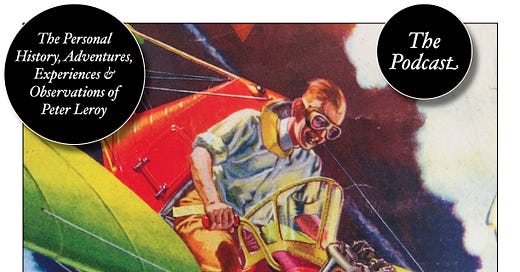“Fantastic Contraptions” at first lay on the dusky line between the fading giveaway program and the coming competitive program, but over the course of its history it moved with the times toward out-and-out competition. In the first part of the show, amateur inventors would bring their creations onstage and explain and demonstrate them. This part was a lot like show-and-tell. One after another, the inventors presented their gadgets. Then, at the end of the show, each inventor would return and stand before the audience to receive its applause. The one who got the most applause won a prize of some sort. I could watch most of the show before I went to school, but I had to dash outside and catch the bus, so I couldn’t see the finish, when the winning inventor was rewarded. For many viewers—not for me, but for many others, I think—the parade of gadgets and gadget makers would have been boring without Freddie and Flo, who made it hilarious. They had a running gag of behaving as if they had just blundered onto this show, unprepared, and every now and then, when something particularly outrageous occurred, they would turn and look at each other, asking, silently, “How did we get into this?” I would laugh at that look every time. The fact that they could make me laugh at the same thing again and again seemed to me a remarkable achievement. They also asked funny questions about the gadgets and maintained a seamless line of banter, apparently improvised, that frequently wandered far from the matter at hand, leaving the inventor standing to one side, puzzled and speechless, wondering whether he’d been forgotten, until, after a circuitous, hilarious, and sometimes quite personal digression, Flo and Freddie returned, always, unerringly and brilliantly, to the precise point in the discussion of the invention that had set them off on their ramble, catching the inventor flat-footed and woolgathering, to the delight of the audience.
The fantastic contraptions on Flo and Freddie’s show were mechanical or electromechanical. In every case, a contraption’s announced purpose was accomplished—if it was accomplished—with a great deal of clattering and clanking and whizzing and whirring. Wheels turned, gears spun, armatures moved, bells rang, lights flashed. Many—it would probably be more accurate to say most—of the machines seemed to be failures. That is, they failed to accomplish what their inventors claimed they would. Many others seemed to have no purpose at all, and their inventors never even claimed any for them. When asked what the thing they held so proudly was supposed to do, they would just say something like, “Well, now, Freddie and Flo, I’m not going to tell you what this here gadget of mine does. I’m going to let you figure that out for yourself. [Here Freddie and Flo would exchange that look that got me every time.] What say we just flip this little switch here on the side and see how she goes?” I could tell, from the moment an inventor began talking along those lines, that the machine was going to be one of those that accomplished nothing, one of the ones that hummed and spun and rattled and clanked itself into a heap of scrap while the audience roared and Flo and Freddie exchanged looks.
Every machine, whether it had a reasonable purpose or not, included a lot of redundant or apparently useless parts. Off to the side a pinwheel would whirl, for example, catching the light, catching the eye, but contributing nothing at all to the declared purpose of the machine. I used to wonder, when I watched that distracting pinwheel spin and flash, what had gone wrong in the mind of the inventor. What had made him include this useless bit that glittered so dazzlingly, drawing attention to itself and its uselessness? How had the inventor allowed himself to get so carried away? Why hadn’t he heard a reasonable inner voice telling him that enough was enough? When his contraption was complete and he stood back to admire it, didn’t he notice this vestige of a lapse in his thinking, this souvenir of a stroll down a mental dead end? Wasn’t he embarrassed by it? Apparently not. Apparently he didn’t even notice it, though it stood out like Cyrano’s nose. I noticed it, everyone else watching the show must have noticed it, and Freddie and Flo exchanged quips about it, but the inventor seemed entirely unaware of it, grinning helplessly in his ignorance, unaware of the cause of all the hilarity. I was embarrassed for him and others like him, even ashamed for them, standing in front of us with their mistakes showing, but Flo and Freddie never seemed to take advantage of them. Not at all. The oddities may have sparked their humorous remarks, but those remarks were never made at the expense of the inventor. They never humiliated the poor guy. Instead, they would seize upon the superfluity in the machine—its worst, most embarrassing mistake—and from it they would wander off into a rambling anecdote about Flo’s bumbling uncle. This seemed to me wonderfully generous. Right in front of them they had the source of many an easy laugh, but they barely used it, just took off from it, and in doing so actually distracted us from it. Freddie might arch his enormous eyebrows at the superfluous whatsit, and Flo might flick it with a long-nailed finger and shrug when it spun uselessly, but then they would take off, leading us elsewhere, diverting us, making the useless appendix seem a small and forgivable error. I admired them for this skill and for the generosity that seemed to underlie it.
[to be continued]
In Topical Guide 567, Mark Dorset considers Gadgets: Fantastical, Useless, Self-Destructive from this episode.
Have you missed an episode or two or several?
You can begin reading at the beginning or you can catch up by visiting the archive or consulting the index to the Topical Guide.
You can listen to the episodes on the Personal History podcast. Begin at the beginning or scroll through the episodes to find what you’ve missed.
You can listen to “My Mother Takes a Tumble” and “Do Clams Bite?” complete and uninterrupted as audiobooks through YouTube.
You can ensure that you never miss a future issue by getting a free subscription. (You can help support the work by choosing a paid subscription instead.)
At Apple Books you can download free eBooks of Little Follies, Herb ’n’ Lorna, and Reservations Recommended.
You’ll find overviews of the entire work in An Introduction to The Personal History, Adventures, Experiences & Observations of Peter Leroy (a pdf document) and at Encyclopedia.com.














Share this post